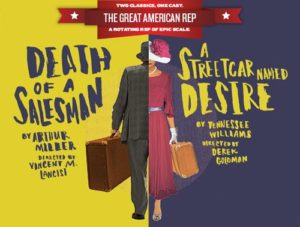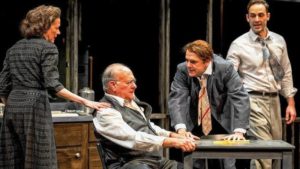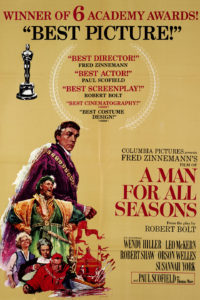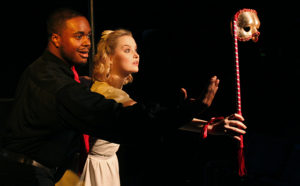 “It is a defect of God’s humor that he directs our hearts everywhere but to those who have a right to them.”
“It is a defect of God’s humor that he directs our hearts everywhere but to those who have a right to them.”
Tom Stoppard, Arcadia
Terry Teachout on the arts in New York City
 In today’s Wall Street Journal I file the first of two reports from Baltimore’s Everyman Theatre, which is currently presenting Death of a Salesman and A Streetcar Named Desire in rotating repertory. Here’s an excerpt.
In today’s Wall Street Journal I file the first of two reports from Baltimore’s Everyman Theatre, which is currently presenting Death of a Salesman and A Streetcar Named Desire in rotating repertory. Here’s an excerpt.
* * *
Old-fashioned repertory theater, in which a resident ensemble of actors performs a varied group of plays that are mounted in regular rotation, is so much a thing of the past that unless you frequent summer festivals—or major opera houses—you’re not likely ever to have seen it in action. It costs too much for most regional companies even to consider maintaining a permanent or semi-permanent resident acting ensemble, and without the existence of such an ensemble, rotating repertory is impractical to the point of impossibility. Instead we typically get productions in which actors and designers are thrown together on an ad-hoc basis to do shows that run for a month or so, after which a brand-new team of artists is assembled to rehearse and perform a brand-new show.
It goes without saying that such productions can be distinguished—that’s how Broadway works—but it’s also true that the aesthetic unanimity of an ensemble whose members know one another’s styles and minds can immeasurably enhance a show’s total effect. So Baltimore’s Everyman Theatre is doing something very much out of the ordinary by performing Arthur Miller’s “Death of a Salesman” and Tennessee Williams’ “A Streetcar Named Desire,” the two most popular and influential American plays of the ’40s, in rotating repertory….
It makes perfect sense to do “Salesman” and “Streetcar” in this way, not least because the two plays, for all their obvious differences, have much in common: Both are dramas of domestic discontent, part naturalistic and part poetic, that opened on Broadway in groundbreaking productions that were directed by Elia Kazan, designed by Jo Mielziner and accompanied by the incidental music of Alex North. Yet Everyman is, so far as anyone seems to know, the first company in the world ever to present them in rotating repertory, and having recently seen both productions in close succession, I can assure you that to do so is a powerfully stirring experience, one that will stick with you for a long time to come….
 Since “Death of a Salesman” opened first, I’ll put off discussing “Streetcar” until next week and concentrate instead on the considerable virtues of Vincent M. Lancisi’s “Salesman” staging, which is traditional in the best possible way. Mr. Lancisi has steered clear of the high-concept road favored by Ivo van Hove in his recent Broadway revivals of “The Crucible” and “A View from the Bridge.” His “Salesman” is Miller’s “Salesman,” played out with absolute and admirable transparency on a skeletal two-story set designed by Daniel Ettinger that is unmistakably reminiscent (though not slavishly so) of the original Broadway production. The scale of the acting is as modest as that of Everyman’s 250-seat auditorium: Wil Love, who plays Willy Loman, appears to be the shortest man in the cast, and his performance, by turns querulous and ingratiating, is the living embodiment of one of Willy’s most striking lines, “I still feel—kind of temporary about myself.”…
Since “Death of a Salesman” opened first, I’ll put off discussing “Streetcar” until next week and concentrate instead on the considerable virtues of Vincent M. Lancisi’s “Salesman” staging, which is traditional in the best possible way. Mr. Lancisi has steered clear of the high-concept road favored by Ivo van Hove in his recent Broadway revivals of “The Crucible” and “A View from the Bridge.” His “Salesman” is Miller’s “Salesman,” played out with absolute and admirable transparency on a skeletal two-story set designed by Daniel Ettinger that is unmistakably reminiscent (though not slavishly so) of the original Broadway production. The scale of the acting is as modest as that of Everyman’s 250-seat auditorium: Wil Love, who plays Willy Loman, appears to be the shortest man in the cast, and his performance, by turns querulous and ingratiating, is the living embodiment of one of Willy’s most striking lines, “I still feel—kind of temporary about myself.”…
The signal advantage of this approach is that it offsets the fundamental flaw of “Salesman,” which is Miller’s lifelong weakness for pseudo-poetic sentiment. Play it too big and it comes off sounding inflated. Let the hot air out and the result is a different, truer poetry, the kind that arises from simply showing life as it is. That’s what Messrs. Love and Lancisi and their on- and offstage collaborators have done…
* * *
Read the whole thing here.
The trailer for Everyman Theatre’s productions of Death of a Salesman and A Streetcar Named Desire:
The 1966 TV version of Death of a Salesman, starring Lee J. Cobb and Mildred Dunnock, both of whom created their roles in the original Broadway production:
 Gwen Verdon and Chita Rivera perform “Nowadays” and “Hot Honey Rag” on The Mike Douglas Show and are interviewed by Douglas. The songs were written by Fred Kander and John Ebb for the score of Chicago, in which Verdon and Rivera created the roles of Roxie Hart and Velma Kelly. This program, telecast in 1976, documents Bob Fosse’s staging of the numbers in the original Broadway production:
Gwen Verdon and Chita Rivera perform “Nowadays” and “Hot Honey Rag” on The Mike Douglas Show and are interviewed by Douglas. The songs were written by Fred Kander and John Ebb for the score of Chicago, in which Verdon and Rivera created the roles of Roxie Hart and Velma Kelly. This program, telecast in 1976, documents Bob Fosse’s staging of the numbers in the original Broadway production:
(This is the latest in a series of arts-related videos that appear in this space each Monday, Wednesday, and Friday)
In today’s Wall Street Journal “Sightings” column I talk about the decline of the play-based film. Here’s an excerpt.
* * *
Fifty years ago, “A Man for All Seasons” and “Who’s Afraid of Virginia Woolf?” hit big at the box office and tore up the Oscars. Yet both films were screen versions of dead-serious Broadway plays that came out in the same year as the undemanding likes of “Fantastic Voyage” and “Our Man Flint.” How could so challenging a pair of movies possibly have gone over with the popcorn set?
 Viewed from the vantage point of 2016, the year of “Batman v Superman: Dawn of Justice” and “My Big Fat Greek Wedding 2,” the mere existence of these two films may seem like a cultural miracle. Yet it used to be standard operating procedure for Hollywood. In 1966 it was still perfectly normal for hit plays to be turned into big-budget movies. Most of them, to be sure, were fluffy comedies like “Arsenic and Old Lace” and “The Odd Couple,” but Hollywood also made a point of filming such critically acclaimed dramas as “The Little Foxes,” “Picnic” and “A Streetcar Named Desire,” all three of which did quite well at the box office.
Viewed from the vantage point of 2016, the year of “Batman v Superman: Dawn of Justice” and “My Big Fat Greek Wedding 2,” the mere existence of these two films may seem like a cultural miracle. Yet it used to be standard operating procedure for Hollywood. In 1966 it was still perfectly normal for hit plays to be turned into big-budget movies. Most of them, to be sure, were fluffy comedies like “Arsenic and Old Lace” and “The Odd Couple,” but Hollywood also made a point of filming such critically acclaimed dramas as “The Little Foxes,” “Picnic” and “A Streetcar Named Desire,” all three of which did quite well at the box office.
Why were such movies made? Because the plays on which they were based had high name recognition, not just in New York but throughout America. You didn’t have to be a bred-in-the-bone Manhattanite to know who Lillian Hellman, William Inge and Tennessee Williams were: You could read about them in Time, Life and Newsweek, which routinely covered Broadway openings, just as stage actors and playwrights appeared no less routinely on popular TV shows like “Tonight” and “What’s My Line?” Because of this coverage, theater was a part of the national cultural conversation. The citizens of Dubuque knew who Stanley Kowalski was long before they went to the neighborhood movie house in 1951 to see “A Streetcar Named Desire.” They’d already seen Eliot Elisofon’s beefcake-worthy photograph of Marlon Brando kneeling before Kim Hunter in Life’s 1947 feature story about the Broadway production. This meant that a hit play was not merely grist for the Hollywood mill but a hot property in its own right….
* * *
Read the whole thing here.
A scene from the film version of Who’s Afraid of Virginia Woolf:
Here’s my list of recommended Broadway, off-Broadway, and out-of-town shows, updated weekly. In all cases, I gave these shows favorable reviews (if sometimes qualifiedly so) in The Wall Street Journal when they opened. For more information, click on the title.
BROADWAY:
• An American in Paris (musical, G, too complex for small children, reviewed here)
• The Color Purple (musical, PG-13, virtually all performances sold out last week, reviewed here)
• Eclipsed (drama, PG-13, Broadway remounting of off-Broadway production, closes June 19, original production reviewed here)
• Fully Committed (comedy, PG-13, closes July 24, reviewed here)
• Fun Home (serious musical, PG-13, some performances sold out last week, reviewed here)
• Hamilton (musical, PG-13, Broadway transfer of off-Broadway production, all performances sold out last week, reviewed here)
• The King and I (musical, G, perfect for children with well-developed attention spans, some performances sold out last week, reviewed here)
• Matilda (musical, G, closing Jan. 1, reviewed here)
• Les Misérables (musical, G, too long and complicated for young children, closes Sept. 4, reviewed here)
• On Your Feet! (jukebox musical, G, reviewed here)
• She Loves Me (musical, G, suitable for bright children capable of enjoying a love story, many performances sold out last week, closes July 10, reviewed here)
 OFF BROADWAY:
OFF BROADWAY:
• The Fantasticks (musical, G, suitable for children capable of enjoying a love story, reviewed here)
CLOSING SOON IN CHICAGO:
• Mary Page Marlowe (drama, PG-13, extended through June 5, reviewed here)
CLOSING SUNDAY OFF BROADWAY:
• Stupid Fu**ing Bird (serious comedy, PG-13, contains nudity, reviewed here)
Seeing as how I’m in the process of making my professional debut as a stage director—and that the play I’m directing also happens to be the first one I’ve written—I thought it might be amusing to post a list of ten things that I’ve still yet to do.
As of today, I’ve never:
• Taken a selfie
• Worn flip-flops
• Successfully learned a foreign language (though I tried three times)
 • Seen the Grand Canyon in person
• Seen the Grand Canyon in person
• Changed a diaper
• Cooked a full-scale meal without assistance
• Read Bleak House, whether complete or abridged
• Gone camping alone in the wild, even for a single night
• Driven in excess of a hundred miles an hour
• Set foot on a cruise ship or in a casino
Hey, you never know!
* * *
UPDATE: I forgot that I posted a similar list in 2007. (Only one item appears on both lists.) Alas, I’ve done one of those things since then.
| M | T | W | T | F | S | S |
|---|---|---|---|---|---|---|
| 1 | 2 | 3 | 4 | 5 | ||
| 6 | 7 | 8 | 9 | 10 | 11 | 12 |
| 13 | 14 | 15 | 16 | 17 | 18 | 19 |
| 20 | 21 | 22 | 23 | 24 | 25 | 26 |
| 27 | 28 | 29 | 30 | 31 | ||
An ArtsJournal Blog